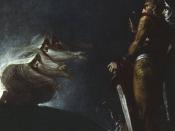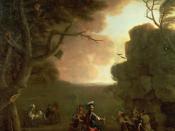In Macbeth by William Shakespeare, the author is communicates very strong and important ideas about ambition. He communicates this idea through the protagonist of the play, Macbeth. Shakespeare communicates ambition through the actions of the main character and through the thoughts of this infamous character.
Ambition is an important idea in Macbeth. Ambition is both good and bad. In Macbeth, ambition is more vividly expressed as a dark and evil trait shown by Macbeth but it is also communicated subtlety as an honourable trait. Macbeth is one of the greatest and most respected generals in King Duncan's army. He got to his position of respect and honor because he was ambitious, this is the only part of the play where Macbeths ambition as seen as good. After the witches' prophecy, Macbeth's ambition is only seen as evil and deceitful this has significantly changed from how ambition was portrayed by the same character earlier.
The author is trying to show that ambition is both good and bad and that people need to realize when their ambition is not good so that they change and don't follow in the footsteps of Macbeth because in the end dark ambition will lead to death as it did Macbeth in the play Macbeth.
Before the witches' prophecy Macbeth's ambition is shown to be good. The important idea of ambition is portrayed as good and healthy. Macbeth became the respected general because of his ambition. He wanted to be a great leader and his ambition drove him to that. And People loved him for it. Duncan described Macbeth after the commander's account on the battle field with the words: 'Oh, valiant cousin, worth gentleman'. Macbeth's ambition at this point was under control. He didn't kill his own blood while they slept, did not plot against the crown. He was honorable. He only wanted what was best for Scotland and was a loyal soldier. Shakespeare communicates good, healthy ambition through Macbeth when he is commended on his efforts of protecting Scotland from its enemies. Macbeth was honored when King Duncan bestowed on him the title of "Thane of Cawdor" because Duncan trusted Macbeth and this was because his ambition was healthy.
Ambition after the witches' prophecy, the crucial idea of ambition is only displayed by Macbeth as a negative trait. The thought of being king as foretold by the prophecy was too much for Macbeth's inner evil ambition and he could no longer contain it. Macbeth drifted into this evil and Shakespeare portrayed how evil this ambition was, in Act one Scene Seven. Macbeth is pondering whether to kill Duncan and over the course we discover that Macbeth is more concerned with getting caught that the murder of his own family. Macbeth acknowledges that his ambition is dark and uses it as an excuse to kill Duncan. "To prick the sides of my intent, but only Vaulting ambition, which o'erleaps itself And falls on th' other." This shows that Macbeth is using his ambition as an excuse to do unlawful and unethical things. Shakespeare uses Macbeth to put forward his idea of dark ambition and this was shown through Macbeth's soliloquy. The audience then saw how blind Macbeth's dark ambition has made him. He shows this idea of evil ambition through Macbeth and the deceitful and horrible way he acts using his ambition as the excuse.
The important idea of ambition takes two completely different forms in the same character with only one event that was the catalyst for the change. Ambition during the captain's account of the battle was noble and looked up as great. Macbeth was an impeccable example of this perfect idea. His dark ambition was controlled, locked up inside him and good was only shown. Then came the witches' prophecy. It appealed greatly to Macbeth's inner evil and drove him to do all that was possible in order to secure the crown. But it was not the witches' alone who unleashed Macbeth's darkness. His wife further developed and fed his ambition because she realized that his only fear. Failure. Macbeth showed this fear he had when he asked lady Macbeth: "if we should fail?" Realizing this Lady Macbeth just drove Macbeth's inner evil out and killed Duncan. Macbeth became a tyrant, he killed innocent people like his dear friend Banquo because he didn't want Banquo's descendants to be kings. Ambition was from there on only displayed as a negative attribute. Macbeth's dark ambition leads him from a "worthy gentleman" to a "evil butcher". Shakespeare used his man as a puppet. He used him to communicate his idea that dark ambition will make you evil and will drive away or kill all those who love you. Macbeth killed his king, his friend, the wife, son and servants of a noble and finally his dark ambition and the dark ambition of his wife lead her to suicide and Macbeth was now alone. Shakespeare used this image, this moment to vividly signify that the cause for all the suffering was dark ambition and this was impeccable displayed by the protagonist Macbeth. From respected, honorable general to "evil butcher".
Ambition is discrete. It can only be good or bad. And it is an important idea in Macbeth. Shakespeare showed both these sides and in the minds of the audience communicated the results of both good and dark ambition. He used his main character, his protagonist Macbeth to communicate his idea clearly and manipulated his audience to see Macbeth as an evil tyrant at the end of his drama script. At the end there is no mention of Macbeth's greatness during Malcolm's speech, only the evil of his regime. Shakespeare uses this contrast to show his ideas on ambition and the path's it could take you. He effectively communicated these paths through Macbeth and the consequences of each path. Shakespeare made the idea important by always linking Macbeth's choices to his ambition and this vividly communicated the important ideas on ambition in all its forms.
Reference (Biblography):Green, F. (1994) based on: Shakespeare, W (1623). Heinemann Shakespeare: Macbeth. Oxford. Heinemann Educational Publisher





